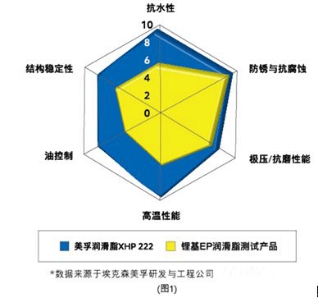No More Fear about Choices! My Boss No Longer Worries about the "Yellow Oil" Selected by Me!
Click:5558 Date:2016-02-17 10:36:00 Information Source:Internet
Abstract: Facing a complex variety, various brands and colors of "yellow oils" on the market, we might have already felt numb. Even so, every time when we decide which "yellow oil" to apply on the bearings, we cannot help thinking of the different parameters behind the colors. When we think of the sad eyes of our boss, we will become fearful and worried and know nowhere to start.
Lubricating grease is commonly known as industrial "yellow oil", which has found extensive applications in bearings. Industrial yellow oil not only can protect bearings from abrasion and rolling elements from rusting, but also can help isolate from dusts, wastes and other air pollutants. Facing the various brands and colors of "yellow oils", we might have already felt numb. However, we will become fearful and worried and know nowhere to start when we need to decide which "yellow oil" to apply on the bearings and think of the different parameters and the sad look of our boss.
Getting rid of disturbance factors, grasping the core, we can simplify the dazzling data and select a proper "yellow oil" for your bearings without much "worry". In the actual operation, it's a simple and effective method for screening a proper lubricating grease in the steps of "one point", "two degrees" and "four properties".
I. Identifying the proper type of "yellow oil" with one point
Lubricating grease is a semi-solid lubricant made up of base oil, additives and thickening agent, in which the thickener is not only a carrier of base oil and additives to prevent them from leaking in the application, but also influences the properties of lubricating grease such as stability, range of using temperature and water resistance. Some common thickeners include metallic soap and composite metallic soap composed of calcium, lithium, sodium, aluminum or barium.
Dropping point means the temperature which makes the lubricating melt or makes it lubricant separate from thickener. Therefore, the first step is to select a "yellow oil" with a proper thickener based on the working temperature of bearings under different working conditions.
Normally under a high temperature, it requires using a lubricating grease with a high dropping point. Generally speaking, the dropping point of lubricating grease with thickener of composite lithium base and poly-urea base is approximately 500°F (260℃) or above.

II. Finding the application range by confirming two indexes
Different equipment such as motor, rolling mill or turbine adopt different types of bearings, with varying requirements in the properties of lubricating grease, with which the viscosity and thickness of lubricating grease can be confirmed. The following two standards can be used as the most common indexes for selecting lubricating grease for bearings of motors.
Viscosity: The viscosity of lubricating grease is closely related with the temperature. The viscosity of base oil should meet the requirements of negative load and rotation speed under the operation temperature, which is helpful for providing better protection and extending the service life of elements. For example, the viscosity of typical mineral oil in some motor lubricating grease should be 500-600SUS@100°F (107~129 cSt@37.8°C).
Thickness: It is one of the most common properties of lubricating grease. The thickness or hardness of lubricating grease is called NLGI grade, which ranges from 000 to 6. The lubricating grease with NLGI 2 is the most common lubricating grease for bearings of motors.
III. Finding a right lubricating grease for equipment and parts by mastering four properties
To help the bearings better unleash their performance, after understanding the requirements of the equipment and parts on temperature and whether it is a concentrated grease supply system, we need to check the four major properties of "yellow oil" one by one:
Anti-oxidation: An excellent anti-oxidation property can extend the service life of bearings under a fast speed and a high temperature. The relatively common reference standard on the market is ASTM D3336 service life test of lubricating grease under a high temperature, which tests the performance of lubricating grease for bearings under extreme conditions. Therefore, for lubricating the bearings working under increasingly rigid working environment, the high-standard ASTM D3336 lubricating grease is the first option.
Abrasion resistance: Through the oil film maintained at the surface of moving parts, the ability of lubricating grease to guard against abrasion due to mutual contact between metals is referred to as abrasion resistance.
Shear stability: ASTM D 217 penetration degree test method for lubricating grease can be used to test its stability after 100,00 times of working strokes. Take the bearings of motors as an example, in the test, the softening degree of lubricating grease shall not exceed 1 to 1.5 NLGI degrees. If it exceeds the values, the lubricating grease will leak from the bearings with the ageing of the grease.
Compatibility: Except for some special conditions, the mutual incompatibility should be taken into account before using lubricating greases with different thickeners. If it's unavoidable to mix different lubricating greases, it's suggested to conduct a compatibility test. Generally speaking, incompatible lubricating greases will be softened or turn into a fluid, which will result in different kinds of lubrication faults. Therefore, it's necessary to guarantee that old lubricating grease is removed as much as possible and the lubricating grease should be replaced often, thereby removing the old lubricating grease from the bearings.
Of course, if you still feel that the aforesaid method is not convenient and quick enough, why not try the online oil selection tool launched by suppliers of lubricants. These professional tools integrate various information of lubricant products under their brands such as various properties, data, application environments and equipment. The most proper lubricant products will be recommended by setting the conditions. Mobil's SM is an online oil selection assistant. The users only need to enter specific information such as industries, applications and equipment to be recommended with a proper Mobil industrial lubricant and references of related performances.


